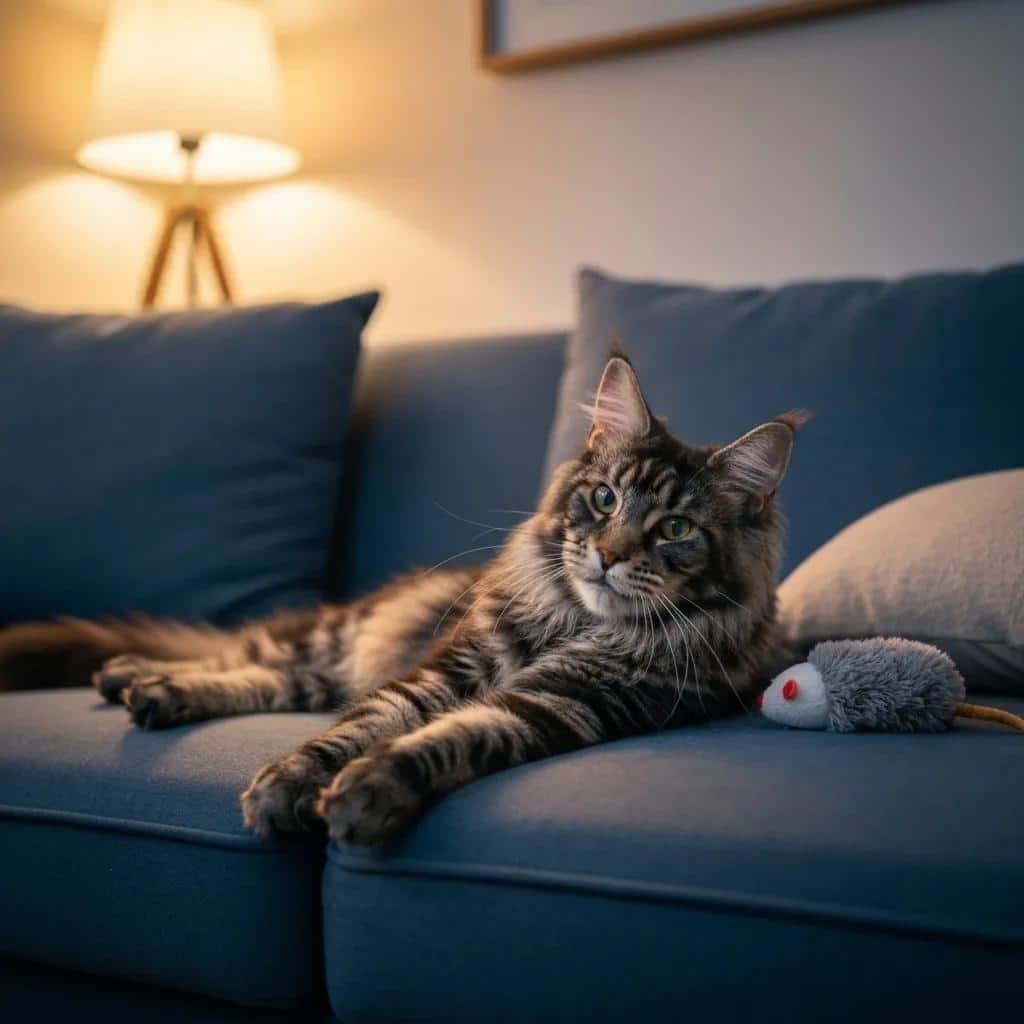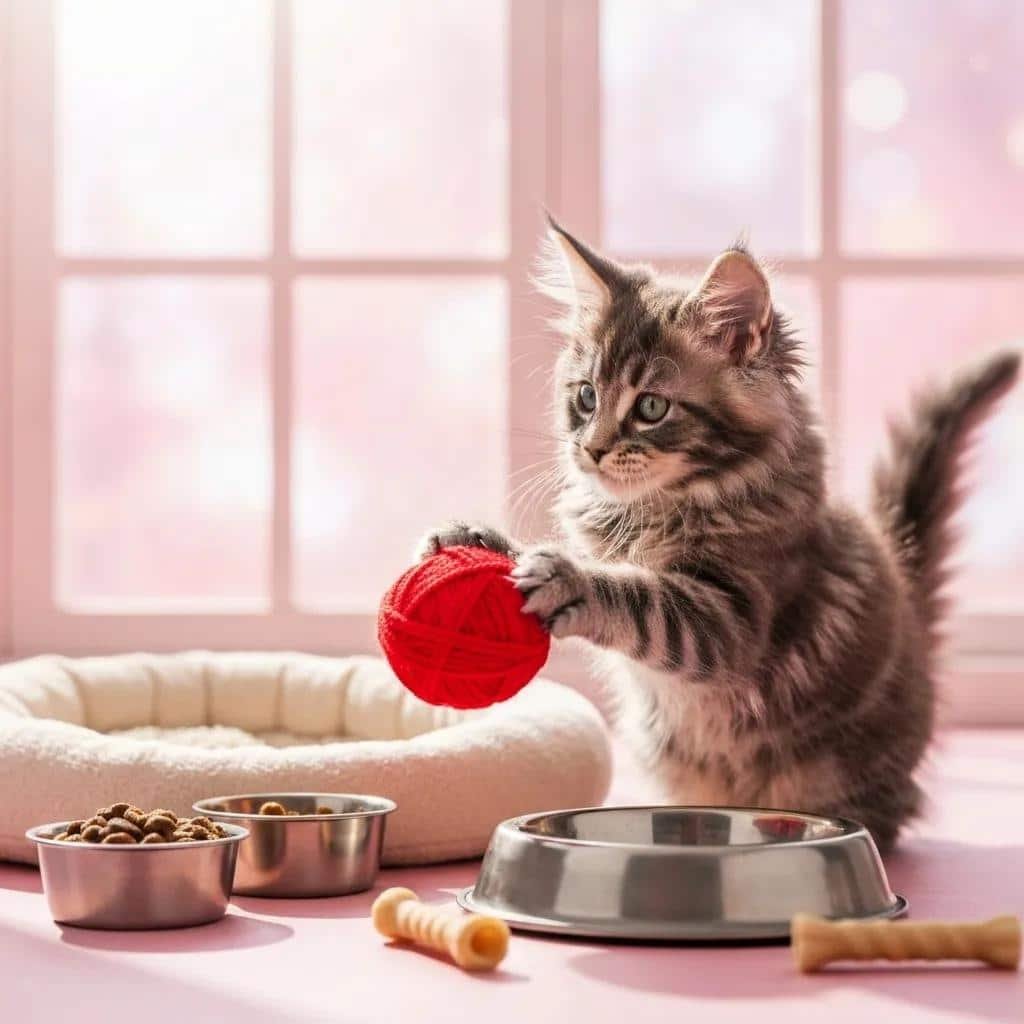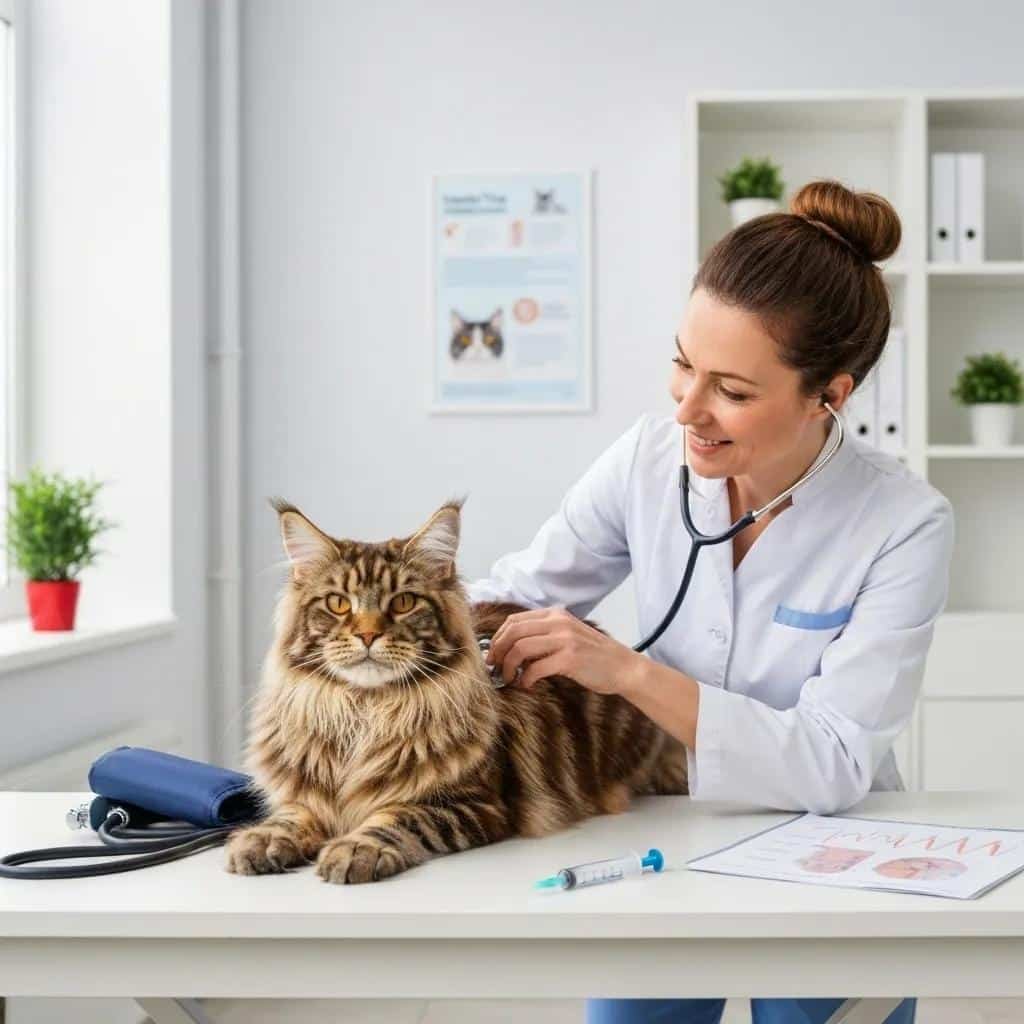
Understanding the Total Cost of Owning and Caring for a Maine Coon Cat
Welcoming a Maine Coon into your family blends joy with responsibility, and understanding the total cost of ownership—from the purchase price to lifetime care—is essential for any prospective owner. This guide lays out every financial aspect: initial investment, annual outlays, lifetime planning, cost drivers, budgeting tactics, health prevention, and breeder selection. You’ll discover how breeder credentials, pedigree guarantees, and pet insurance shape expenses, alongside actionable tips to balance quality care with smart spending. Bellspurr’s experience as a TICA-registered cattery with five-year health guarantees and lifetime support underpins these insights, ensuring you’re fully prepared for the journey ahead.
What Is the Initial Cost of Bringing a Maine Coon Kitten Home?

How Much Does a Purebred Maine Coon Kitten Cost from a Reputable Breeder?
A purebred Maine Coon kitten from a responsible breeder typically ranges between $1,200 and $2,500 due to rigorous health testing, pedigree documentation, and early socialization. This investment covers:
- Health screenings for HCM, SMA, and hip dysplasia
- TICA registration and pedigree certificates
- Microchipping and initial vaccinations
Such expenditures guarantee a robust genetic foundation and reduce the likelihood of costly health issues later, setting the stage for predictable long-term care.
What Are the First Veterinary Expenses for a Maine Coon Kitten?
Initial veterinary care for a Maine Coon kitten usually includes vaccinations, spay/neuter surgery, and microchipping, totaling $300–$600. Common procedures include:
- Core vaccinations (FVRCP, rabies)
- Deworming and parasite prevention
- Spay/neuter surgery and anesthetic fees
- Microchip implantation and registration
These preventive measures foster long-term health and pave the way for routine wellness visits as your kitten grows, reinforcing the value of a comprehensive health plan.
Which Essential Supplies Are Needed for a New Maine Coon Kitten?
Equipping your home for a Maine Coon requires sturdy supplies designed for a large, active cat. Essential items and their approximate costs include:
- Litter box and liners: $40–$80
- Food and water bowls (heavy-duty): $20–$50
- Sturdy carrier: $60–$120
- Interactive toys and teaser wands: $30–$60
- Cat tree suited to a 15–20 lb cat: $150–$300
Investing in quality accessories enhances safety and comfort for your kitten, seamlessly transitioning into ongoing enrichment and grooming needs.
Check our videos on YouTube to learn more about us.
How Does Bellspurr’s Health Guarantee and Pedigree Add Value to Initial Costs?
Bellspurr’s five-year health guarantee and documented lineage directly offset future veterinary expenses by ensuring each kitten is genetically screened and socialized. This approach:
- Reduces the risk of hereditary conditions
- Provides breeder support for medical questions
- Grants peace of mind with documented pedigree
Such assurances reinforce the initial outlay as a long-term investment in both health and temperament, linking purchase value to sustained well-being.
What Are the Annual Expenses of Owning a Maine Coon Cat?
How Much Does Feeding a Large Maine Coon Cat Cost Annually?
Feeding a Maine Coon requires high-protein, premium food that supports joint health and coat maintenance. Annual feeding costs range from $600 to $1,200 depending on diet choice.
| Food Type | Monthly Cost | Annual Cost |
|---|---|---|
| Premium Dry | $40–$60 | $480–$720 |
| High-quality Wet | $60–$80 | $720–$960 |
| Supplements | $10–$15 | $120–$180 |
Choosing balanced nutrition promotes muscle maintenance and reduces risks of obesity, preparing your cat for routine care and active play throughout the year.
What Are the Typical Costs for Litter and Hygiene Supplies?
Maintaining hygiene for a large Maine Coon involves regular litter replacement and grooming supplies, costing $200–$400 annually:
- Clumping litter replacement: $15–$25 per month
- Odor-control cleaning products: $5–$10 per month
- Litter box liners and deodorizers
Quality hygiene products ensure a clean environment and complement grooming routines, which in turn reduce shedding and hair-ball treatments.
How Much Is Routine Veterinary Care Each Year?
Annual wellness visits, vaccinations, and parasite prevention for a Maine Coon generally total $200–$400 per year:
- Annual exam and booster shots: $100–$200
- Flea, tick, and heartworm prevention: $50–$100
- Dental check and basic bloodwork: $50–$100
Regular veterinary oversight maintains optimal health and catches emerging issues early, linking back to the value of preventive investments outlined in initial veterinary costs.
What Are the Grooming Needs and Associated Costs for Maine Coons?
Maine Coons require weekly brushing and occasional professional deshedding, with annual grooming expenses spanning $100–$300:
- Premium brush and comb: $25–$50 (one-time)
- Professional groomer deshedding session: $50–$100 per visit
- Nail trims and ear cleaning supplies
Consistent grooming curbs matting and hairballs, enhancing coat health and reinforcing the importance of quality supplies introduced earlier.
How Much Should You Budget for Toys and Enrichment?
Interactive play keeps Maine Coons mentally stimulated and physically active, with annual toy and enrichment spending around $100–$200:
- Puzzle feeders and treat dispensers: $30–$60
- Cat tree replacement or upgrades: $100–$200 over several years
- Rotating interactive toys
Providing varied enrichment supports behavioral health and extends the benefits of initial toy investments into a sustainable routine.
What Is the Lifetime Financial Commitment of Owning a Maine Coon Cat?
How Much Does Pet Insurance for a Maine Coon Typically Cost?

Pet insurance premiums for Maine Coons average $30–$45 per month, or $360–$540 annually, reflecting breed predispositions to HCM and hip dysplasia. Coverage plans include:
- Accident and illness policies
- Hereditary condition riders
- Wellness add-ons for preventive care
Securing insurance early caps unexpected veterinary bills and aligns with the risk mitigation strategies Bellspurr embeds in its health guarantee.
What Are Common Health Issues and Their Potential Treatment Costs?
Maine Coons face specific conditions that can require significant treatment. These conditions can significantly impact the lifetime costs of owning a Maine Coon cat.
| Condition | Treatment Cost | Notes |
|---|---|---|
| Hypertrophic Cardiomyopathy (HCM) | $500–$1,500 annually | Includes scans and medications |
| Hip Dysplasia | $2,000–$4,000 surgical | Often requires joint supplements |
| Spinal Muscular Atrophy (SMA) | $1,000–$2,500 testing | Genetic screening and therapy |
Understanding these expenses underscores the value of preventive breeding practices and insurance policies that Bellspurr advocates.
Why Is an Emergency Fund Important for Maine Coon Owners?
An emergency fund of$1,000–$2,000 ensures you can address unexpected surgeries, trauma care, or sudden illnesses without delay. Prompt treatment reduces complication risks and complements ongoing preventive spending on pet insurance and routine vet visits.
How Does Senior Cat Care Affect Lifetime Costs?
As Maine Coons enter their senior years (10+), annual expenses often rise by 20–30% due to:
- Specialized diets for joint and kidney health
- Bi-annual veterinary exams and bloodwork
- Additional supplements and mobility aids
Proactive senior planning maintains quality of life and ties back to lifetime cost projections that start with initial investments and pet insurance strategies.
Why Are Maine Coon Cats More Expensive to Own Than Other Breeds?
How Does Responsible Breeding Impact Maine Coon Purchase Price?
Ethical breeders invest in genetic health testing, quality housing, and socialization, raising kitten prices but minimizing health complications. This approach yields stronger kittens with stable temperaments, translating purchase premiums into reduced lifetime veterinary and behavioral expenses.
What Long-Term Savings Come from Buying a Healthy, Well-Bred Kitten?
A healthy foundation reduces the incidence of hereditary diseases and behavioral issues. Owners often save $500–$1,500 over a cat’s lifetime in avoidable vet bills and training costs, illustrating how initial breeder investments yield measurable economic returns.
How Does Geographic Location Influence Maine Coon Ownership Costs?
Regional variations affect veterinarian fees, pet supply prices, and shipping costs for kittens. Urban areas may average 10–20% higher veterinary rates, while rural regions often offer lower supply and routine care expenses, guiding budget adjustments based on location.
What Are the Differences Between Pet, Show, and Breeding Quality Maine Coons?
| Quality Type | Average Price | Care Implications |
|---|---|---|
| Pet Quality | $1,200–$2,500 | Standard health checks, family-focused socialization |
| Show Quality | $2,500–$5,000 | Extensive pedigree documentation and handling |
| Breeding Stock | $5,000+ | Advanced genetic screening and TICA responsibilities |
Choosing the right quality aligns your budget with expectations for lineage, health oversight, and potential breeding plans.
How Can You Budget Effectively for Maine Coon Cat Care?
What Are Practical Tips to Save Money Without Compromising Care?
Smart money-saving strategies maintain high standards:
- Purchase multi-cat bulk food discounts
- Groom at home using professional tools
- Schedule preventive vet visits to avoid emergency costs
- Rotate durable toys instead of frequent replacements
These tactics reinforce quality care while lowering recurring expenses.
How Can a Cost Calculator Help Estimate Your Maine Coon Expenses?
Interactive budgeting tools allow you to input regional vet rates, diet preferences, and grooming frequency to generate a personalized annual and lifetime cost projection. This clarity supports informed decision-making and avoids budget shortfalls.
What Should You Include in a Maine Coon Care Budget?
A comprehensive budget covers:
- Initial Costs: Purchase, first vet visits, supplies
- Annual Expenses: Food, litter, grooming, preventive care
- Emergency Fund: Unplanned medical treatments
- Lifetime Provisions: Insurance premiums and senior care
Accounting for each category ensures no surprises and aligns spending with your cat’s changing needs.
How Does Pet Insurance Fit into Your Overall Budget?
Integrating pet insurance premiums into your monthly outlay stabilizes health-care costs, shifting unpredictable vet bills into manageable, predictable payments. Comparing coverage options ensures you select plans that cover hereditary conditions common to Maine Coons.
Health Costs and Prevention Affect Maine Coon Ownership Expenses
What Genetic Health Screenings Are Recommended for Maine Coons?
Essential screenings include:
- DNA tests for SMA and HCM
- Hip and elbow X-rays
- Annual cardiac ultrasounds
Early detection fosters targeted care plans and reduces the impact of hereditary conditions on overall expenses.
How Does Bellspurr’s Health Guarantee Reduce Future Vet Expenses?
By providing a five-year health warranty, Bellspurr commits to covering specific hereditary conditions and offering breeder-guided support. This guarantee effectively shares risk and underscores the breeder’s accountability, lowering out-of-pocket costs for owners and pet insurance.
What Are the Costs of Treating Common Maine Coon Health Conditions?
- Routine HCM monitoring: $300–$800 per exam
- Hip dysplasia management: $200–$600 annually in supplements
- Emergency surgery (trauma): $1,000–$3,000
Anticipating these figures guides owners toward comprehensive preventive care strategies.
Check our Videos on Tiktok to learn more about us
How Does Pet Insurance Cover Hereditary Conditions in Maine Coons?
Quality insurance plans often include hereditary condition riders at an extra premium. Coverage percentages range from 70% to 90% of treatment costs, capping annual payouts to mitigate high-cost genetic therapies and surgeries.
How Do You Choose a Reputable Maine Coon Breeder to Maximize Value?
What Are the Signs of a Responsible, TICA-Registered Maine Coon Breeder?
Look for breeders who:
- Publish genetic health test results
- Offer on-site kitten visits and socialization
- Provide written health guarantees
- Maintain active TICA membership
These attributes ensure ethical practices and long-term support for your veterinarian partnership.
How Does Pedigree Influence Maine Coon Kitten Price and Quality?
A documented pedigree traces lineage to champions and health-tested cats, justifying premium prices and indicating stronger breed standards.
Pedigrees correlate with temperament consistency and breed-typical physical traits.
What Support and Services Should You Expect from a Quality Breeder?
A dedicated breeder delivers:
- Lifetime health consultation
- Weekly updates from birth until adoption
- Safe delivery options or in-person pickup guidance
- Post-adoption advice on training and diet
Such ongoing services reinforce confidence and facilitate smooth transitions into your home.
What Red Flags Indicate a Less Trustworthy Maine Coon Breeder?
Warning signs include:
- Lack of health certificates or genetic testing results
- Poor kitten living conditions or limited socialization
- Absence of a formal guarantee or contract
- Unwillingness to provide references or facility visits
Spotting these issues protects you from substandard breeding and hidden costs.
Selecting a breeder with transparent practices, robust health screening, and genuine support maximizes both kitten quality and your long-term financial peace of mind.
Owning a Maine Coon requires a well-planned financial commitment, but investing wisely in a healthy, ethically bred kitten and maintaining proactive care strategies transforms costs into predictable, manageable expenses. With clear budgeting, preventive health measures, and the right breeder partnership, you’ll enjoy the companionship of a majestic Maine Coon without unwelcome surprises.


